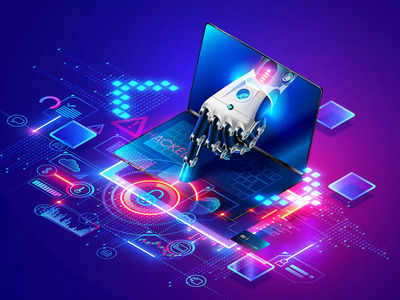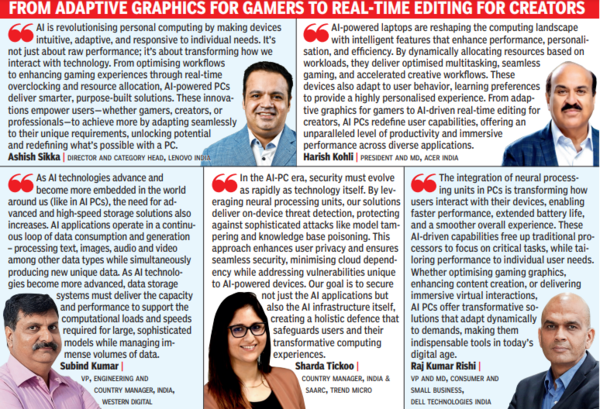
Personal computers were a marvel when they were invented decades ago, and while they have changed dramatically over the years, they have also remained familiar in many ways. Artificial intelligence is rapidly changing the game. AI transforms traditional PCs into intelligent, adaptive tools that improve productivity, creativity and security. This allows these devices to learn, adapt and respond to individual user needs.
In other words, AI in PCs This isn’t just an improvement in speed or processing power: it represents a fundamental shift in the way we interact with technology. Ashish Sikka, Director and Category Head, Lenovo India, says AI is revolutionizing experiences. It claims that AI-driven overclocking and real-time device optimization tools allow users to dynamically push the limits of the CPU (making the PC run faster), optimize CPU resources game and efficiently manage workflows, all via natural language commands.
Harish Kohli, Chairman and Managing Director, Acer India, echoes this sentiment. It claims that by dynamically allocating resources such as CPU, GPU and RAM based on workload demands, AI-powered laptops deliver exceptional performance for gaming, creative tasks and applications professionals. Features such as adaptive graphics The settings, real-time video editing assistance and AI-enhanced noise reduction, he says, demonstrate how AI allows users to do more with their devices.

Rise of NPUs
The integration of neural processing units (NPU) in modern PCs is a key factor in these advances. Unlike traditional processors, NPUs are designed to efficiently handle AI-specific tasks, freeing up the CPU and GPU to focus on other operations. Raj Kumar Rishi, vice president and general manager of consumer and small business sectors at Dell Technologies India, says that offloading AI tasks to NPUs results in faster performance, longer battery life and smoother user experience. In gaming, he says, AI-powered tools optimize graphics, reduce latency and improve responsiveness, helping to deliver that feeling of immersion that gamers love. For creators, AI simplifies complex workflows, automating tasks like color grading and noise reduction to streamline production.
Even online video calls benefit from NPUs, says Rishi. “One of our devices uses intuitive AI capabilities, such as noise reduction, auto-framing and enhanced eye contact, to ensure video calls and presentations are smooth and effortless,” explains -he.
Built-in cybersecurity
NPUs are also designed to handle complex tasks such as cybersecurity functions. Sharda Tickoo, country manager for India and Africa at cybersecurity firm Trend Micro, says the company’s solutions leverage NPUs to perform advanced threat detection directly on the device. “This enables intelligent, nuanced and targeted protection that has never been done before,” she says.
According to her, dedicated neural processing units will perform on-device threat analysis at a more sophisticated level than traditional cloud-based security models. “NPUs have the capacity to process big data, which gathered the detection of anomalies and intrusions associated with threats. These AI capabilities built into next-generation PCs result in the creation of a revolutionary security paradigm,” she says.
But now these devices are also susceptible to new risks such as model tampering, knowledge base poisoning, and unauthorized manipulation of AI decision-making algorithms that normal PCs did not have. to worry about, notes Tickoo. “This is why federated learning approaches, as well as granular access control mechanisms, become important to protect these smart devices. »


